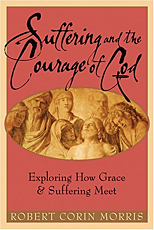Robert Corin Morris is an Episcopal priest and the founder of Interweave, an ecumenical community learning center for spirituality, wellness, and the common good. He is the author of Wrestling with Grace: A Spirituality for the Rough Edges of Daily Life, which was one of The Best Spirituality Books of 2003. In this inspiring and edifying paperback, pastor and spiritual director Robert Corin Morris presents his understanding of the confluence of grace and suffering. He writes out of the long-term emotional pain and discomfort of his own battles with chronic depression and bipolar disease. While Christians have traditionally spoken of redemptive suffering, he prefers the idea of suffering redemptively. This means facing suffering or adversity with an open heart and a belief that it can contain "some hidden divine energy for good."
The Bible gives us three possible reasons for suffering: ignorance, the destructive behavior of sinfulness, and the wildness of the world. Morris points to the following path that gives us reason to hope: "Nothing is outside of God's ability to redeem and fit into a pattern for good. This co-presence of suffering and compassion is one aspect of the framework of meaning revealed not only in human experience, but in the overall story told by Scripture. Such a framework of meaning that can help us be open to love and see the possibility of new life even in the most tragic of circumstances is gospel — 'good news' — indeed. Such experiences invite us to trust this unconquerable love and let it strengthen our resilience as we face confusion, frustration, and even seeming futility." In addition the great biblical saga portrays God as a creator who is always bringing good out of everything — even in the plight of those who experience incredible suffering. This, of course, is demonstrated by Jesus: "Christ's way of suffering redemptively models the courage that can grow us strong, caring, and supple as we face any adversity. For Christ, for us, and for everyone who has found such courage in the midst of adversity, the source of victory is the same: God's own courage in the midst of a world of dazzling beauty, soul-sustaining goodness, and sometimes terrifying adversity." For Morris, the grace of God does not save us from suffering but enables us to endure its heavy burdens. One of the tools given to us is prayer, which the author defines beautifully as "our connection with the larger world of God's goodness that surrounds the narrow space of our difficulties." Morris lays out some spiritual exercises that can help open our hearts to grace.
